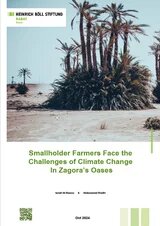Smallholder Farmers Face the Challenges of Climate Change In Zagora’s Oases
Researchers have continuously investigated the impact of climate change
on smallholder farmers in the oasis regions of Zagora province. Specifically,
a study led by HBS researchers in 2017 examined the annual decline of
groundwater levels, estimated at 15-20 cubic meters. Their research
identified a corresponding reduction in date production by 34%, alongside
the trend of population density surpassing 700 inhabitants per square
kilometer of arable land in recent years. To address these issues in our
research, we employed qualitative methods including on-site field
observations, digital monitoring techniques, as well as individual and group
interviews. We conducted 20 interviews with smallholder farmers, youth,
and women to reveal their livelihood experiences and alternative strategies
to subsist on farming activities after the continued drought. Additionally, we
conducted interviews with civic and political actors as well as researchers in
the field, to understand the ethnographic changes amongst the local
population. We aimed to identify patterns and the emergence of adaptive
solutions to resist the new challenges posed by the contemporary context,
preserving the "oasis spirit," and the sustainability of the local ecosystem
in these areas.
